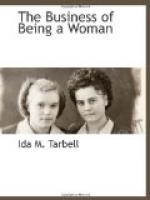If two years ago when the question of a higher duty on hosiery was before Congress any woman or club of women had come forward with carefully tabulated experiments, showing exactly the changes which have gone on of late years in the shape, color, and wearing quality of the 15-, 25-, and 50-cent stockings, the stockings of the poor, she would have rendered a genuine economic service. The women held mass meetings and prepared petitions instead, using on the one side the information the shopkeepers furnished, on the other that which the stocking manufacturers furnished. Agitation based upon anything but personal knowlledge is not a public service. It may be easily a grave public danger. The facts needed for fixing the hosiery duty the women should have furnished, for they buy the stockings.
If the Uneasy American Woman were really fulfilling her economic functions to-day, she would never allow a short pound of butter, a yard of adulterated woolen goods, to come into her home. She would never buy a ready-made garment which did not bear the label of the Consumer’s League. She would recognize that she is a guardian of quality, honesty, and humanity in industry.
A persistent misconception of the nature and the possibilities of this practical side of the Business of Being a Woman runs through all present-day discussions of the changes in household economy. The woman no longer has a chance to pay her way, we are told, because it is really cheaper to buy bread than to bake it, to buy jam than to put it up. Of course, this is a part of the vicious notion that a woman only makes an economic return by the manual labor she does. The Uneasy Woman takes up the point and complains that she has nothing to do. But this release from certain kinds of labor once necessary, merely puts upon her the obligation to apply the ingenuity and imagination necessary to make her business meet the changes of an ever changing world. Because the conditions under which a household must be run now are not what they were fifty years ago is no proof that the woman no longer has here an important field of labor. There is more to the practical side of her business than preparing food for the family! It means, for one thing, the directing of its wants. The success of a household lies largely in its power of selection. To-day selection has given way to accumulation. The family becomes too often an incorporated company for getting things—with frightful results. The woman holds the only strong strategic position from which to war on this tendency, as well as on the habits of wastefulness which are making our national life increasingly hard and ugly. She is so positioned that she can cultivate and enforce simplicity and thrift, the two habits which make most for elegance and for satisfaction in the material things of life.
Whenever a woman does master this economic side of her business in a manner worthy of its importance, she establishes the most effective school for teaching thrift, quality, management, selection—all the factors in the economic problem. Such scientific household management is the rarest kind of a training school. And here we touch the most vital part in the Woman’s Business—that of education.




